高一英语第四单元Travel旅行教案
Travel教案_1

Travel教案_1第一篇:Travel教案_1Travel教案module1TravelUnit1Theflightwaslate.Lingling:welcomeback,everyone!welcomeback!欢迎回来welcometospl.eg.welcometochina!Betty:HiLingling!Howwasyourholiday?Lingling:Notbad!IwenttoHenanProvince.Butthetripbackwasv erylong.Thetrainwasfullofpeople,andIhadtostandforoversixhours .Betty:Badluck.where’sTony?Daming:He’sstayingwithhisfamilyintheUk,andflyingbacktomorrow.The flightswerelatetoday.Betty:whyistravelsodifficultinwinter?Lingling:well,it’sthebusiestseasoninchinabecauseofSpringFestival.wheredi dyougo,Daming?becauseof/becauseDaming:weflewtoHongkong–andtheflightwaslate!ButwetooktheboattoLandauIslandandwentt oDisneyland.takeataxitakeatraintakeaplaneLingling:Howaboutyou,Betty?Betty:wehadquiteagoodtimeinBeijing.wewentsightseeingby busandbytaxi.Andlastweekend,wetookatourbycoachtotheSumm erPalaceandwentforalongwalk.gosightseeinggofishinggocampinggoshoppingDaming:Andnow,bettergetb acktowork…we’vegotexamsatthee ndoftheterm.bettergetbacktowork=you’dbettergetbacktowork. ---’dbetter(not)dohave/hasgot与have/has的区别Betty:yes,butthereareplentyoffunthingstodothisterm…thesc hooltrip…plentyof=alotof=lotsof既可以修饰可数名词,又可以修饰不可数名词eg.Ihaveplentyofreasonstorefusehim.wehaveplentyofwatert odrink.Lingling:…andtheschoolleavers’party…Daming:…thevisittotheEnglish-speakingtheatreinBeijing… Lingling:AndourtriptoLosAngeles!we’llhaveagreattime!Unit2you’resittinginmyseat.Excuseme,you’resittinginmys eat.ThetraintoBeijing!Linoftendreamedaboutthetrain,andaboutg oingtothecapital.Nowitwasinfrontofhim,tosetoffsoon.Helookeda thisbrother.dreamof/about+名词,代词/V-ing“梦到,梦见,梦想eg.Thegirldreamtabouthermotherlastnight.Theboydreamsab out/ofbecomingapilot.dream+名词,代词/that从句eg.Idreamtadreamjustnow.Ineverdreamtthathewassuchaper son.infrontof/inthefrontofsetoff“出发、动身”=setouteg.we’llsetoffassoonashecomesback.Theysetoutinsearchof thelostchild.补充:setabout着手做setup搭起,建起setfree释放“Don’tforgetwhereyoucomefrom,littlebrother,”jinsaid.“A ndwa tchyourbagscarefully.”Linnodded,unabletospeak.Thiswashisfirstlongtripbytrainatth estartofhisnewlife,leavinghisvillageandhishomeforthelast16years .unabletospeak,形容词短语,作状语,说明点头时的状态eg.Thelittlegirlranbackhome,happyandjoyful.Hestoodthere,c oldandhungry.be(un)abletodoatthestartof=atthebeginningofHeheldjininhisarms.withtearsinhiseyes,jinpushedLinaway.“G o,brother.writetousassoonasyougetthere,ok?”with+名词+介词短语eg.Astrangerbrokeintothebar,withaguninhishand.with+名词+副词eg.Hefellasleeponthesofa,withtheTVon.with+名词+不定式短语eg.withsomuchhomeworktodo,hecan’tgoouttoplay.with+名词+V-ing eg.withsomanypeoplecominginandout,Ijustcan’tgettosleep.wit h+名词+过去分词短语eg.Thethiefwastakentothepolicestation,withhishandstiedbeh ind.Assoonashecomes,I’lltellhimaboutit.Linjumpedontothetrain .Therewerepeopleandbagseverywhere.Hepushedpastthemtowar dshisseat.past/passAyoungmanwassittinginLin’sseat.Hewaswearingjeansandaverysmartjacket,andwassm okingacigarette.whatshouldhedo?SixpairsofeyeslookedatLin,whil ethemanlookedoutofthewindow.“Sir,you’resitti nginmyseat,”Linsaid,withanervoussmile.Theotherpeoplewatchedwithinterest.withinterest作状语eg.Thechildrenarelisteningtoastorywithinterest.eg.withnodo ubt/withoutdoubt,ourteamwillwinthegame.Themandidn ’tturntolookatLin,butjustlookedoutofthewindow.turntodo 转身去做某事eg.Heknewwhatwasgoingonbehindhim,sohedidn’tturntolook.“Excuseme,Ihaveaticketwiththenumberoftheseatyou’resittingi n!”Linsaidinastrongervoice.eg.Thisisasleepingbagthatasoldiersl eepsin.Thisisthelifehehasalwaysdreamtof.Sheisthepersonyoumus ttakecareof.ina…voiceeg.Thelittlegirlhasasweetvoice.Heisnotingoodvoice.noise,so und,voice “Ialsohaveaticketwiththatnumber–”thoughitisinanothercar.Besides,Iwasherefirst,saidtheman, withoutmovinghishead.Thoughhewassitting,helookedverytallan dstrong.besides/excepteg.weallwenttotheconcertexceptjim.Thereweremanyothersa ttheconcertbesidesus.Linlookedattheotherpassengersforhelp.“B ut…”hestartedtosay.“Butwhat?”ThemanturnedandlookedatLin .“I’mnotmoving.” Finallyamanwearingglassesspokeinaloudvoice.“Thisyoungmanh astherightticketforthatseat.youshouldmove.”V-ing短语作定语,放在名词后面eg.Theyhaveheardtheexcitingnews.Ving作定语,放在名词前面eg.Theyhaveheardtheexcitingnews.Linfeltbrave.“See?Pleasemove.I’vegotalongwaytogo.”havegotalongwaytogo=havealongwaytogoeg.youmusthaveagoodsleep.T omorrowwe’llhavealongwayto go.引申义:you’vegotalongwaytogobeforeyoubecomeapopstar.“Howlon g?”theyoungmanasked.“Tothelaststop,Beijing.”“I’mgettingoffbeforeyou.Thenyoucanhavemyseat.”getoff——getongetinto——getoutof“whereisthat?”askedLin.“Hangzhou.”LinthoughtHangzhouwasfaraway.“It’ssevenhoursawayfromhere,“Evenifit”’themanwithglassessaid.sonly10minutes,youshouldmove .”Slowlytheyoungmanstoodup,droppedhiscigaretteonthefloor ,anddisappeareddownthetrain.【典型例题】.It’scoldoutside.you’dbetter______yourwarmclothes,Lucy.A.putonB.toputonc.puttingonD.put2.Doesjohnknowanyotherforeignlanguage________French?A.exceptB.butc.besidesD.beside3.Theyhadlearned2300words_________lastweek.A.intheendB.bytheendc.attheendofD.bytheendof4.Iwill________thetrainatBeijingStation.Thenyoucanhavemyse at.A.takeoffB.getoffc.setoffD.putoff5.Thisdressstilllooksprettyonyou,_________itisoutofstyle.A.tho ughB.butc.inspiteofD.becauseof6.Hissonwentthroughthedoor,_______abasketballinhishand.A. inB.onc.withD.at7.Isit_______theclassroomsothatIcanhearclearly.A.infrontB.inthefrontc.infrontofD.inthefrontof8.________booksarethere;________booksis300.A.Thenumberof; anumberofB.Anumberof;anumberofc.Thenumberof;thenumberofD.Anumberof;thenumberof9.Beijingis_________beautifulcity.A.veryaB.veryc.aquiteD.quitea0.Thoughheisn’tgoodatEnglish,hedoesntwantto_________.A.give upitB.giveoffitc.giveitupD.giveitoff答案:1—5AcDBA6—10cDDDc’第二篇:Through Travel教案Through Travel教案icing/camping/touring/…它们分别表示“去游泳/购物/(乘滑雪板)滑雪/滑冰/钓鱼/野餐/野营/旅游/……”2.startafire 生火例如:Let’sstartafireanddocooking.让我们生火做饭吧。
Unit 4《Travel》word教案
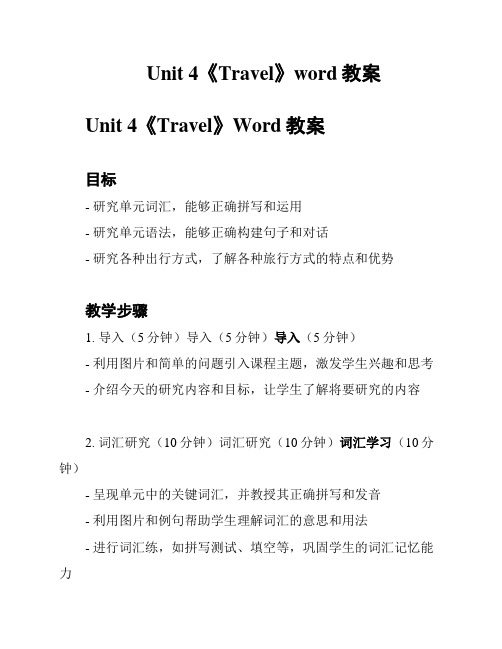
Unit 4《Travel》word教案Unit 4《Travel》Word教案目标- 研究单元词汇,能够正确拼写和运用- 研究单元语法,能够正确构建句子和对话- 研究各种出行方式,了解各种旅行方式的特点和优势教学步骤1. 导入(5分钟)导入(5分钟)导入(5分钟)- 利用图片和简单的问题引入课程主题,激发学生兴趣和思考- 介绍今天的研究内容和目标,让学生了解将要研究的内容2. 词汇研究(10分钟)词汇研究(10分钟)词汇学习(10分钟)- 呈现单元中的关键词汇,并教授其正确拼写和发音- 利用图片和例句帮助学生理解词汇的意思和用法- 进行词汇练,如拼写测试、填空等,巩固学生的词汇记忆能力3. 语法研究(15分钟)语法研究(15分钟)语法学习(15分钟)- 介绍本单元的语法知识,如行为动词的使用、there be句型等- 通过示例句和练让学生掌握语法结构的运用和句子的构建- 引导学生进行语法练,如句型转换、造句等,提高语法应用能力4. 听力训练(15分钟)听力训练(15分钟)听力训练(15分钟)- 播放与本单元内容相关的听力材料- 要求学生仔细听,并针对听力内容进行问题回答,培养学生的听力理解能力- 分析听力材料中的重点词汇、常用表达和语言模式,帮助学生更好地理解听力内容5. 口语表达(15分钟)口语表达(15分钟)口语表达(15分钟)- 设置角色扮演和对话练活动,让学生运用所学内容进行口语表达- 设计问题和情景,引导学生进行对话练,培养学生的口语流利度和表达能力- 鼓励学生互相交流和合作,提供积极反馈和指导6. 任务和练(15分钟)任务和练(15分钟)任务和练习(15分钟)- 分配任务,要求学生完成与本单元相关的小组活动或练题- 监督学生的任务进展,解答学生的问题,帮助他们解决困惑- 收集学生的作业,给予评价和改进建议7. 总结和反馈(5分钟)总结和反馈(5分钟)总结和反馈(5分钟)- 总结本节课的研究内容和要点,强调学生的研究成果和进步- 给予学生针对本节课表现的反馈和建议- 为下节课预告内容,激发学生对研究的兴趣总结本节课旨在通过词汇学习、语法学习、听力训练、口语表达和任务练习,帮助学生掌握与旅行相关的词汇和语法知识,并提高他们的听说能力。
《Unit 4 Reading and Thinking》示范课教案【高中英语人教版】
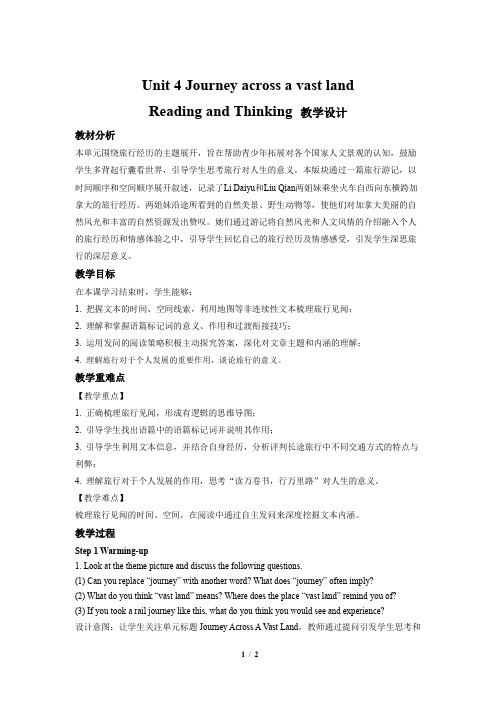
Unit 4 Journey across a vast landReading and Thinking 教学设计教材分析本单元围绕旅行经历的主题展开,旨在帮助青少年拓展对各个国家人文景观的认知,鼓励学生多背起行囊看世界,引导学生思考旅行对人生的意义。
本版块通过一篇旅行游记,以时间顺序和空间顺序展开叙述,记录了Li Daiyu和Liu Qian两姐妹乘坐火车自西向东横跨加拿大的旅行经历。
两姐妹沿途所看到的自然美景、野生动物等,使他们对加拿大美丽的自然风光和丰富的自然资源发出赞叹。
她们通过游记将自然风光和人文风情的介绍融入个人的旅行经历和情感体验之中,引导学生回忆自己的旅行经历及情感感受,引发学生深思旅行的深层意义。
教学目标在本课学习结束时,学生能够:1. 把握文本的时间、空间线索,利用地图等非连续性文本梳理旅行见闻;2. 理解和掌握语篇标记词的意义、作用和过渡衔接技巧;3. 运用发问的阅读策略积极主动探究答案,深化对文章主题和内涵的理解;4. 理解旅行对于个人发展的重要作用,谈论旅行的意义。
教学重难点【教学重点】1. 正确梳理旅行见闻,形成有逻辑的思维导图;2. 引导学生找出语篇中的语篇标记词并说明其作用;3. 引导学生利用文本信息,并结合自身经历,分析评判长途旅行中不同交通方式的特点与利弊;4. 理解旅行对于个人发展的作用,思考“读万卷书,行万里路”对人生的意义。
【教学难点】梳理旅行见闻的时间、空间,在阅读中通过自主发问来深度挖掘文本内涵。
教学过程Step 1 Warming-up1. Look at the theme picture and discuss the following questions.(1) Can you replace “journey” with another word? What does “journey” often imply?(2) What do you think “vast land” means? Where does the place “vast land” remind you of?(3) If you took a rail journey like this, what do you think you would see and experience?设计意图:让学生关注单元标题Journey Across A Vast Land,教师通过提问引发学生思考和讨论。
travel 教案
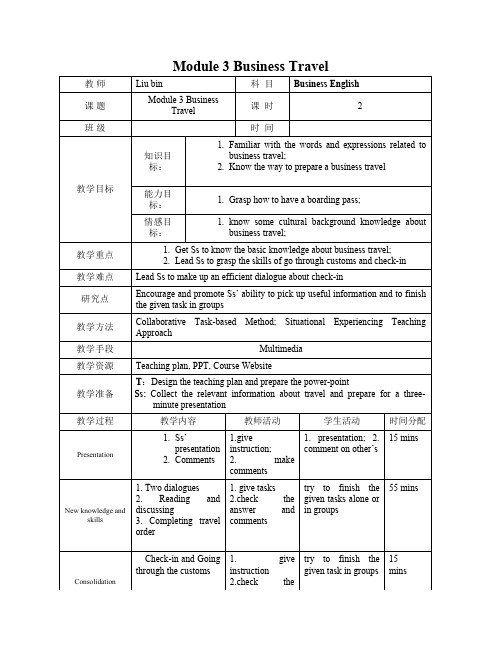
Module 3 Business Travel教师Liu bin科目Business English课题Module 3 BusinessTravel课时2班级时间教学目标知识目标:1. Familiar with the words and expressions related tobusiness travel;2. Know the way to prepare a business travel能力目标:1. Grasp how to have a boarding pass;情感目标:1. know some cultural background knowledge aboutbusiness travel;教学重点1. Get Ss to know the basic knowledge about business travel;2. Lead Ss to grasp the skills of go through customs and check-in教学难点Lead Ss to make up an efficient dialogue about check-in研究点Encourage and promote Ss’ ability to pick up useful information and to finish the given task in groups教学方法Collaborative Task-based Method; Situational Experiencing Teaching Approach教学手段Multimedia 教学资源Teaching plan, PPT, Course Website教学准备T:Design the teaching plan and prepare the power-pointSs: Collect the relevant information about travel and prepare for a three-minute presentation教学过程教学内容教师活动学生活动时间分配Presentation 1. Ss’presentation2. Comments1.giveinstruction;2. makecomments1. presentation;2.comment on other’s15 minsNew knowledge andskills 1. Two dialogues2. Reading anddiscussing3. Completing travelorder1. give tasks2.check theanswer andcommentstry to finish thegiven tasks alone orin groups55 minsConsolidationCheck-in and Goingthrough the customs1. giveinstruction2.check thetry to finish thegiven task in groups15minsanswer and commentsAssignment 1. exercises Assign thehomeworkTake notes; thinkabout thehomework5 mins教学反馈意见对课程培养方案、授课计划的意见对本教案的意见其它Task I Simulation Exercises(模拟练习)Work in groups. Role-play the following situations withyour partners, acting as the Chinese speaker, Englishspeaker and the interpreter respectively. One group will beinvited to perform in class.Situation AMr. King, the sales representative of Universe Toy Company in London has a business meeting in China, the secretary in Chinese company discuss the itinerary with him. Try to do interpreting work.29 March0900 Meeting with Executive Manager1500 Factory visit30 March1000 Going to Trade Fair31 March1000 Conference with Chinese company1400 Shopping1 April Conference with Chinese company2 April Sight seeing in citySituation BYou are a businessman from UK, now come to China to attend an important meeting. Make a speech including:Thanks for the welcome ceremonyExpressions to the purpose of this journeyExpectation of this business tripClosingSample sentences:I feel pleased to attend this meeting… thank you for your nice welcome.I have beening looking forward to this trip, and now I have been more than rewarded.I’m sure my stay here will be a fruitful and enjoyable oneI do hope …Task 2 Vocabulary Development (词汇扩展)Read the following words and expressions. Try to keepthem in mind and find more to enrich your languagebank.A. Useful Words & Expressionshrough the exit/entry formalitiesformation boardpassportngle-entry/multiple-entry visaexit/entry/transit/visitor’s visa d port of entryrival/departuretine certificateduration of staythe declaration form/dutiable goods/articlesduty according to the regulations gage depositoryaggage/luggage tagey/ handcart/pushcartfor theTask 3 Cultural Salon (文化沙龙)Read the following presentation and try to get someDuration of visit to each placePurpose of the visit to each placesScheduled appointmentScheduled dinner meetings, lunch meetings or breakfastmeetingsPreferences as to means of travel or accommodationNumber and identity of people travelingBased on the information above, a tentative itinerary should be worked out. Then follows the action of further confirming the appointments, accommodation, transportation arrangements, eating locations, etc. and the initial travel plan should be modified. If there is not a department responsible for travel arrangements in a company, travel is usually arranged via a travel agency, such as transportation bookings and accommodation reservations.The information related to the travel itinerary include:Detailed information about the dates and times of arrival ineach place to be visitedTypes of transportation, travel preferences, e.g. seatingpreference, in flight meal preference, smoking / non-smoking and accommodation preferred.The following information should be provided:Boss’s nameBoss’ business and home mobile phone numberBoss’s frequent for the travelers club membership detailsMethod of payment for the travel arrangements and creditcard detailsIf the boss travels abroad, the secretary should also ask the travel agency for the certificates required, such as passport, visa, health or police certificates and how to obtain them. When necessary, the secretary should also arrange the health and baggage insurance for the general manger and help to collect the traveler’s checks.The final itinerary presented to the boss should consist of all theactivities concerning the travel and the reservation receipts from thetravel agency. The itinerary should at least be three copies. Onecopy is for the secretary and the other two for the boss.Task 4 Interpreting Practice (口译实践)Work on the following sentences and text. Interpret theminto Chinese and English respectively.A. Sentence Interpreting1. Wherever you go, you’ll see drive-in banks, drive-in restaurants,drive-in churches and drive-in movies.2. Drivers are expected to know and understand the local laws even ifthey don’t live in a particular state.3. Australia is the world’s smallest continent and largest island, and arelatively young nation established in an ancient land.4. A series of geological and historical accidents has made Australiaone of the world’s most attractive countries from the tourist’sviewpoint.5. Tourism is a major industry in Australia, representing about six percent of the gross domestic product and providing, directly orindirectly, around 440,000 jobs.Self-assessment (自我评价)Go over this unit and try to make an assessment on whatyour have learned and performed with the following self-assessment form.Student Self-assessment Form1. Interpreting Skills—Discourse Analysis AB C D1.1 Identification of the four speech types□ □ □ □1.2 Two levels for the identification of the main ideas□ □ □ □2. Linguistic Notes about Business Travel2.1 Useful words and expressions□ □ □ □2.2 Sample sentences □ □ □ □3. Cultural Notes about Business Travel3.1 Secretary’s job □ □ □ □3.2 A tentative itinerary □ □ □ □3.3 Travel agency’s job □ □ □ □4. Phrase Interpreting about Business Travel4.1 Chinese-English □ □ □ □4.2 English-Chinese □ □ □ □5. Sentence Interpreting about Business Travel5.1 Chinese-English □ □ □ □5.2 English-Chinese □ □ □ □6. Text Interpreting about Business Travel6.1 Text A □ □ □ □6.2 Text B □ □ □ □6.3 Text C □ □ □ □6.4 Text D □ □ □ □7. Simulation Exercises about Business Travel7.1 Situation A □ □ □ □7.2 Situation B □ □ □ □Points to Remember(单元要点)An analysis of speech types is a determinant factor ininterpreting.There are four basic speech types: descriptive,persuasive, expository, and narrative.The main ideas of the source speech can be identified at the sentence level and at the discourse level.The most important task for an interpreter is to discern from the clusters of utterances the subject, verb and object.。
Unit4 单元整体教学设计-高中英语人教版(2019)选择性必修第二册

Part 4: Teaching design:课时安排:小单元一
课时
第 1 课时
第 2 课时
内容
Opening Page Reading and Thinking(1)
课 型
学习目标
与主题相关的表达(单词+词块)
语法结构-ed/-ing
1. locate details about the rail
journey by skimming and
scanning the passage;
2. find discourse markers and
读思
understand them;
• structure features of journey
what, who, when, where, how, time
order
Part 4: Teaching design:单元学习目标
长途旅行贴近学生的生活。通过多模态语篇的学习,学生能够: 1. 获取、梳理、整合长途旅行主题相关的信息。 2. 巩固提高听、说、读、写技能。 3. 观察文本,辨别现在分词和过去分词,理解其功能和意义,并在
looking,
passing,
them to make a dialogue.
seen, amazed, rolling, confirming
Part 4: Teaching design:课时安排:小单元二
课时 内容
第 3 课时
Listening and Talking
语篇
Talk about scenery and culture along a journey
高一英语第四单元Travel
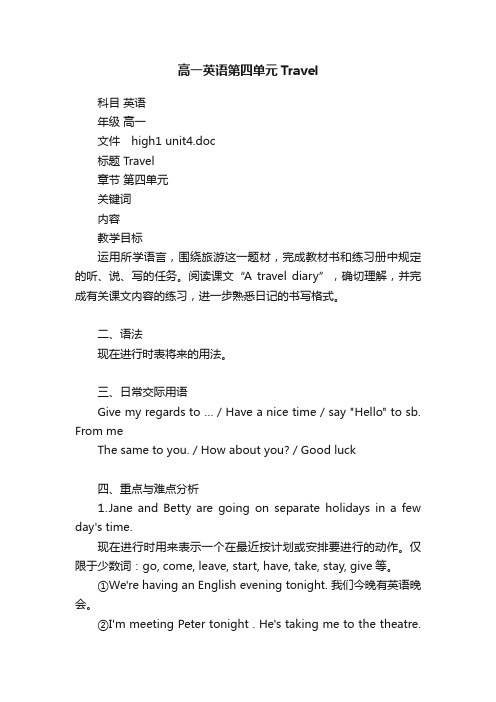
高一英语第四单元Travel科目英语年级高一文件high1 unit4.doc标题 Travel章节第四单元关键词内容教学目标运用所学语言,围绕旅游这一题材,完成教材书和练习册中规定的听、说、写的任务。
阅读课文“A travel diary”,确切理解,并完成有关课文内容的练习,进一步熟悉日记的书写格式。
二、语法现在进行时表将来的用法。
三、日常交际用语Give my regards to … / Have a nice time / say "Hello" to sb. From meThe same to you. / How about you? / Good luck四、重点与难点分析⒈Jane and Betty are going on separate holidays in a few day's time.现在进行时用来表示一个在最近按计划或安排要进行的动作。
仅限于少数词:go, come, leave, start, have, take, stay, give等。
①We're having an English evening tonight. 我们今晚有英语晚会。
②I'm meeting Peter tonight . He's taking me to the theatre.今晚我要和Peter会面,他要带我去看戏。
③They're playing some folk music next. 他们下面将演奏一些民乐。
④How are you going-by boat or by train ? 你们怎么去,坐船还是坐火车?⒉ Do give her my regards.如果句子里没有助动词,可以用do来加强语气,使用do的场合有以下几种:①You do look nice today! 你今天气色真好!You look nice today! 你今天气色不错!②If you do find the book, send it to me. 如果你真的找到了这本书,给我送来。
高一英语第四单元Travel (旅行)教学设计
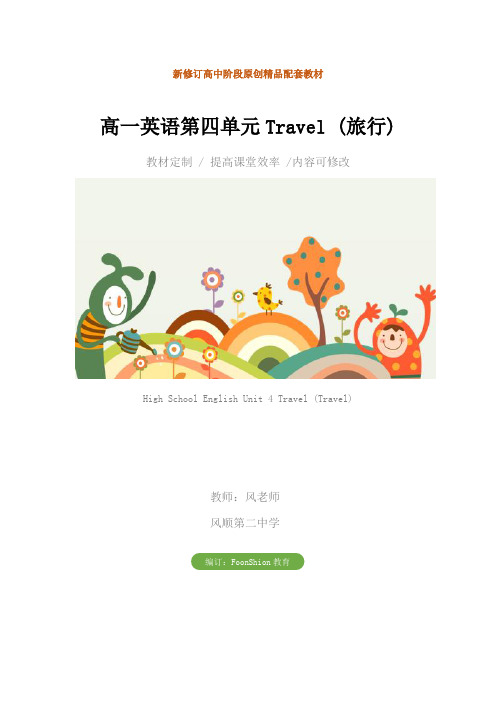
新修订高中阶段原创精品配套教材高一英语第四单元Travel (旅行) 教材定制 / 提高课堂效率 /内容可修改High School English Unit 4 Travel (Travel)教师:风老师风顺第二中学编订:FoonShion教育高一英语第四单元Travel (旅行)科目英语年级高一文件high1 unit4.4.doc标题Travel (旅行)章节第四单元关键词内容一、教法建议【抛砖引玉】同学们,你喜欢旅行吗?从祖国冰天雪地的北疆到风光旖旎的南国,从天山之麓到东海之滨,祖国的名山大川美不胜收。
万里长城是中华民族魂的象征,多少游人足蹬长城激昂慷慨。
冰天雪地的青藏高原,耸立着神圣的珠穆琅玛,有谁不慨叹它的巍峨与高大?波涛涌动的东海之滨,帆影点点,无数志士伟人赞叹它的雄奇与宽阔的胸怀,乘风破浪,直挂云凡济苍海。
登山则情满于山,观海则意溢于海。
看着那鲜花、碧草与冰雪为邻的别样景致,欣赏着白云从身旁飘过,羡慕着雄鹰在天空翱翔,真让人沉浸在美好的遐想中。
如果你到了海边,你一定会感到海在笑,粼粼地笑,一片青苍辽阔的碧水,染透了深邃无边的翠色。
在波涛上轻浮着的渔船,像是摇荡在波澜不惊的油画里。
从乌拉尔山顶的皑皑白雪到白令海峡的滔天海潮,从椰林飘香的印度支那半岛到冰天雪地的西伯利亚荒原,你想领略这一切吗?领略克里姆林宫的威严、感受日内瓦的温柔、欣赏波罗的海的惊涛骇浪、评鉴自由女神像的潇洒。
无论是熙暖韵致的春,浓绿热忱的夏,冷清浪漫的秋,幽静洁白的冬,……每一片土地,每一处古迹都会给你一种无可名状的激情,一种源远流长的文明气息将充溢你的全身,渗入你的每一个细胞。
从本单元的课文中,我们了解到的是在不断的技术创新的动力支撑下,人类征服和超越自然环境、扩大和拓展人工自然的文明进程可谓是风帆高扬、凯歌行进;在当代大多数人的生存环境中,各种建筑物和街道所组成的人工建造的物质环境逐渐取代了由森林、河流、山川和平原所组成的自然环境,充满“田园牧歌”意味的自然环境正逐渐隐去,并退缩到人类意识的一个被遗忘的角落之中。
必修一travellingaround教案(一)

以学生为主体的综合性教学法,讲、练、问、答等方式相结合。
•PPT课件
•旅行视频
•单词表
•图表
•旅游日志模板
•学生分享
•学生写作任务及评分标准
•写一篇旅行日记。要求使用课上所学表达方法,描述自己最近一次旅行的经历,并回答以下问题:你去了哪里?你旅行的目的是什么?你的旅行方式是什么?你带回家了什么纪念品?你是否有感觉不好的时候,你是如何处理的?
4. 练习:
(15分钟)老师出示图表,供学生分组进行讨论和分享。每组讨论后,代表分享一下各自的讨论结果。
5. 语言输出:
(15分钟)老师介绍表达方式和常用句式,并进行相关练习。学生向同伴介绍一次他们去过的旅行,用课上所学表达方法进行描述。
6. 语言输出:
(15分钟)老师指导学生编写一篇旅行日记,并逐步指导学生如何写出一份清晰、丰富、生动的旅行日记。
必修一travellingaround教案(一)
•熟练掌握词汇:hike, backpacking, excursion, itinerary, souvenir等;
•熟悉旅行方式:徒步旅行、背包客旅行、短途旅行;
•掌握谈论旅行经历的表达方式及常用句式;
•能够撰写一份旅行日记。
•旅行方式及相关词汇的掌握;
通过本节课程,学生能够在掌握词汇的基础上,更好地了解不同的旅行方式,并学习了如何描述旅行经历的相关表达方式和常用句式。在练习环节,学生的合作能力得到了充分的展示和锻炼。同时,此课程还对学生培养写作技巧和表达能力产生了积极的影响。
•旅行经历的表达方式及常用句式。
•如何描述不同的旅行方式;
•如何用恰当的方式谈论旅行经历。
高一英语第四单元Travel (旅行)
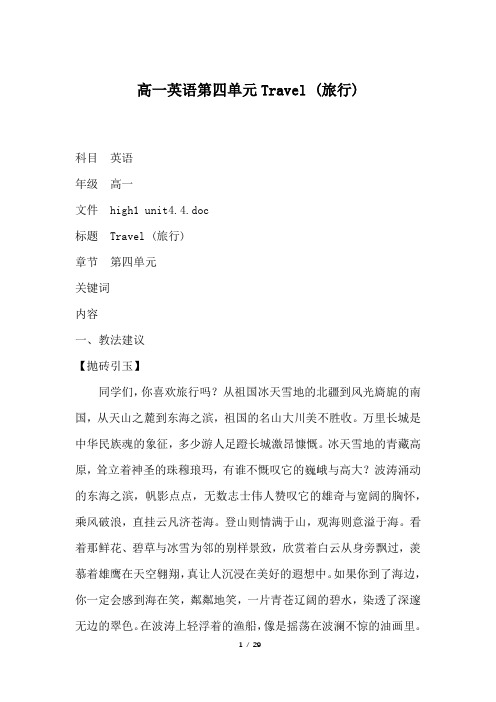
高一英语第四单元Travel (旅行)科目英语年级高一文件high1 unit4.4.doc标题 Travel (旅行)章节第四单元关键词内容一、教法建议【抛砖引玉】同学们,你喜欢旅行吗?从祖国冰天雪地的北疆到风光旖旎的南国,从天山之麓到东海之滨,祖国的名山大川美不胜收。
万里长城是中华民族魂的象征,多少游人足蹬长城激昂慷慨。
冰天雪地的青藏高原,耸立着神圣的珠穆琅玛,有谁不慨叹它的巍峨与高大?波涛涌动的东海之滨,帆影点点,无数志士伟人赞叹它的雄奇与宽阔的胸怀,乘风破浪,直挂云凡济苍海。
登山则情满于山,观海则意溢于海。
看着那鲜花、碧草与冰雪为邻的别样景致,欣赏着白云从身旁飘过,羡慕着雄鹰在天空翱翔,真让人沉浸在美好的遐想中。
如果你到了海边,你一定会感到海在笑,粼粼地笑,一片青苍辽阔的碧水,染透了深邃无边的翠色。
在波涛上轻浮着的渔船,像是摇荡在波澜不惊的油画里。
从乌拉尔山顶的皑皑白雪到白令海峡的滔天海潮,从椰林飘香的印度支那半岛到冰天雪地的西伯利亚荒原,你想领略这一切吗?领略克里姆林宫的威严、感受日内瓦的温柔、欣赏波罗的海的惊涛骇浪、评鉴自由女神像的潇洒。
无论是熙暖韵致的春,浓绿热忱的夏,冷清浪漫的秋,幽静洁白的冬,……每一片土地,每一处古迹都会给你一种无可名状的激情,一种源远流长的文明气息将充溢你的全身,渗入你的每一个细胞。
从本单元的课文中,我们了解到的是在不断的技术创新的动力支撑下,人类征服和超越自然环境、扩大和拓展人工自然的文明进程可谓是风帆高扬、凯歌行进;在当代大多数人的生存环境中,各种建筑物和街道所组成的人工建造的物质环境逐渐取代了由森林、河流、山川和平原所组成的自然环境,充满“田园牧歌”意味的自然环境正逐渐隐去,并退缩到人类意识的一个被遗忘的角落之中。
然而就在社会生产力得到成百倍增加,社会生产方式发生巨大变迁,人口激增,工业化和城市化过程迅猛推进的同时,环境污染作为一种巨大的危机也开始第一次降临到人类的头上:到处是林立的烟囱和浓密的黑烟,浑浊的河流,遍地的工业废物,失去生机的大地和森林。
Travel_高1英语教案完整篇.doc
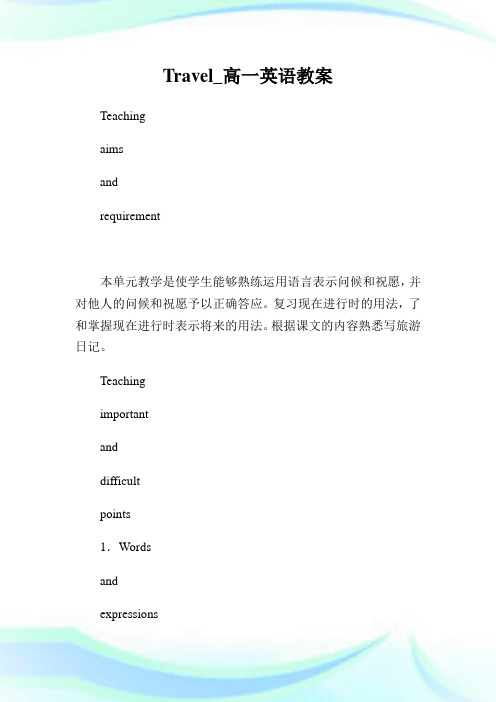
Travel_高一英语教案Teachingaimsandrequirement本单元教学是使学生能够熟练运用语言表示问候和祝愿,并对他人的问候和祝愿予以正确答应。
复习现在进行时的用法,了和掌握现在进行时表示将来的用法。
根据课文的内容熟悉写旅游日记。
Teachingimportantanddifficultpoints1.Wordsandexpressionsseparate, guide, sharp, destroy, through, across, travel, trip, journey, gooff see...offtaketaxi/train/bus...,bytaxi/train/bus...,tie...to,moveon,bemadefrom/of/into/by/,in..everytwoorthree days 2.Useful phasesbeabouttodo; nothing except/but. .3.Oral expressionsGivemyregardsto...Haveanice/good/wonderfultime!Haveagood/pleasant trip!Say“Hi/Hello”tosb.fromme.Goodluck!Thesametoyou! 4.GrammarRevisethe Present Continuous Tenseisoftenusedforplansthenear future.教学建议一、能力训练1.设置若干情境,用现在进行时自编对话,安排未来的学习和生活,并对对方的计划提出良好祝愿。
2.讨论森林遭到破坏的原因。
3.学会制订旅行计划,思考如何解决野外旅行时遇到的意外及如何写好旅行日记。
二、德育渗透1.旅行的意义:开阔视野,丰富知识,陶冶情操等。
2.我国是个森林覆盖率极低的国家,如何保护森林、合理利用现有耕地是个有待解决的问题。
高一英语精品教案 Unit 4 Travel北师大版
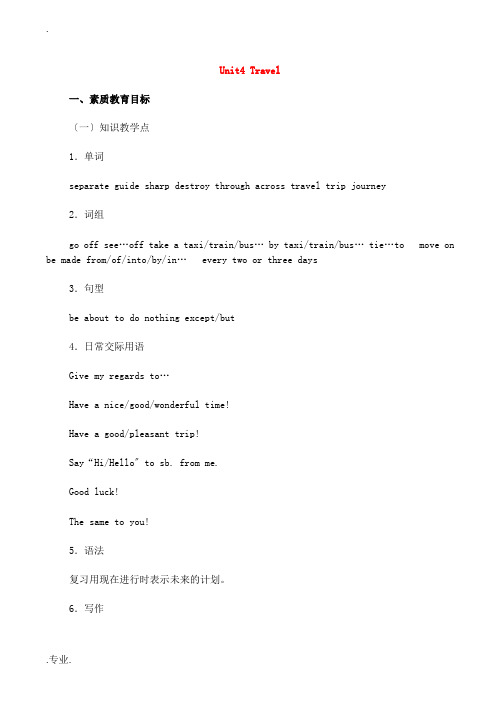
Unit4 Travel一、素质教育目标〔一〕知识教学点1.单词separate guide sharp destroy through across travel trip journey2.词组go off see…off take a taxi/train/bus… by taxi/train/bus… tie…to move on be made from/of/into/by/in… every two or three days3.句型be about to do nothing except/but4.日常交际用语Give my regards to…Have a nice/good/wonderful time!Have a good/pleasant trip!Say“Hi/Hello〞to sb. from me.Good luck!The same to you!5.语法复习用现在进行时表示未来的计划。
6.写作复习日记的书写格式。
〔二〕能力训练点1.设置假设干情境,用现在进行时自编对话,安排未来的学习和生活,并对对方的计划提出良好祝愿。
2.讨论森林遭到破坏的原因。
3.学会制订旅行计划,思考如何解决野外旅行时遇到的意外及如何写好旅行日记。
〔三〕德育渗透点1.旅行的意义:开阔视野,丰富知识,陶冶情操等。
2.我国是个森林覆盖率极低的国家,如何保护森林,合理利用现有耕地是个亟待解决的问题。
二、重点、难点、疑点及解决办法〔一〕重点1.语言知识separate guided estroy see sb. off Say“Hi/Hello〞to sb.动词come, go, leave, start等用正在进行时表示将来的动作。
2.语篇理解森林遭到破坏的原因。
3.写作日记书写格式。
〔二〕难点1.语言知识every two or three daysThe same to you!nothing except/but2.难句理解1〕They can eat a person in a few minutes, leaving only bones.2〕The population of the country is growing every minute.3〕I was just about to go swimming when luckily our guide saw me and shouted at me.〔三〕疑点语言知识be about to do与be going to do的区别。
高中英语_travel话题整合拓展阅读教学设计学情分析教材分析课后反思
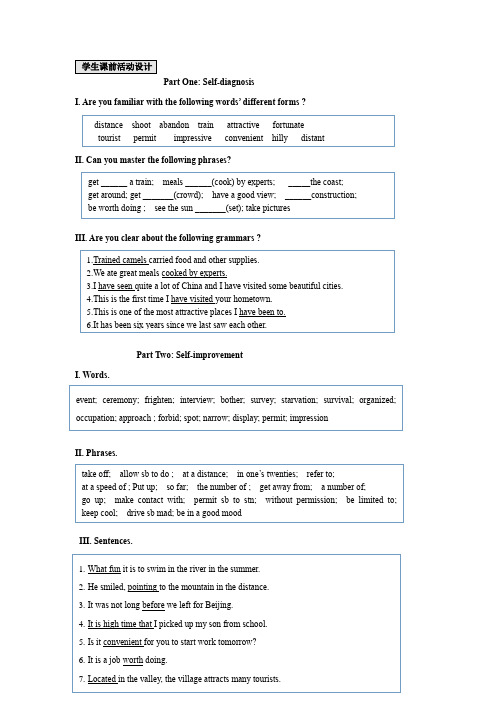
Part One: Self-diagnosisI. Are you familiar with the following words’ different forms ?II. Can you master the following phrases?III. Are you clear about the following grammars ?Part Two: Self-improvementI. Words.II. Phrases.III. Sentences.Intensive Reading TravelI.Watch a video: Answer the question: What’s the video about?II. The aspects mentioned during travelWhen we want to travel, we must make some ______________(prepare). Travel can bring us many ___________(beneficial), such as making friends, helping us against depression, getting more freedom, and so on. But there are also some ____________(problem) arising during travel. Different people choose different ___________to travel. Some people like the train, for they think that the train is economic and comfortable; also some people like to travel by plane, for they think flying fast, convenient and they can get very good service.III. preparationWhat should we prepare before a travel?____________________________________________________________阅读下面短文,根据所读内容,在文章空格里填入一个最恰当的单词。
travel 全英文教案
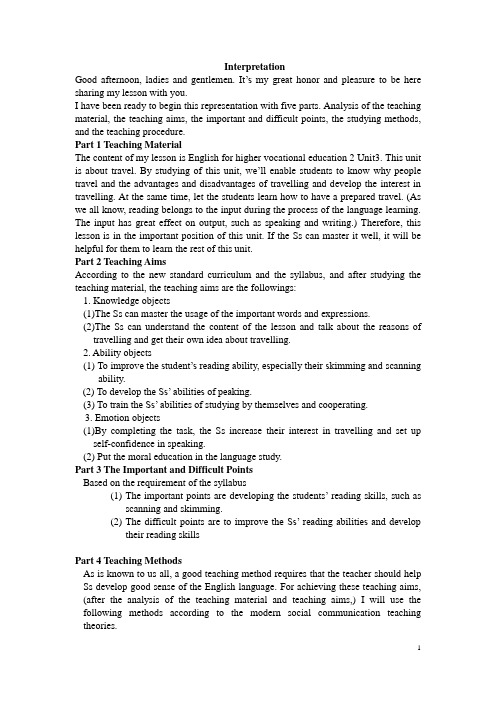
InterpretationGood afternoon, ladies and gentlemen. It’s my great honor and pleasure to be here sharing my lesson with you.I have been ready to begin this representation with five parts. Analysis of the teaching material, the teaching aims, the important and difficult points, the studying methods, and the teaching procedure.Part 1 Teaching MaterialThe content of my lesson is English for higher vocational education 2 Unit3. This unit is about travel. By studying of this unit, we’ll enable students to know why people travel and the advantages and disadvantages of travelling and develop the interest in travelling. At the same time, let the students learn how to have a prepared travel. (As we all know, reading belongs to the input during the process of the language learning. The input has great effect on output, such as speaking and writing.) Therefore, this lesson is in the important position of this unit. If the Ss can master it well, it will be helpful for them to learn the rest of this unit.Part 2 Teaching AimsAccording to the new standard curriculum and the syllabus, and after studying the teaching material, the teaching aims are the followings:1. Knowledge objects(1)The Ss can master the usage of the important words and expressions.(2)The Ss can understand the content of the lesson and talk about the reasons oftravelling and get their own idea about travelling.2. Ability objects(1) To i mprove the student’s reading ability, especially their skimming an d scanningability.(2) To develop the Ss’ abilities of peaking.(3) To train the Ss’ abilit ies of studying by themselves and cooperating.3. Emotion objects(1)By completing the task, the Ss increase their interest in travelling and set upself-confidence in speaking.(2) Put the moral education in the language study.Part 3 The Important and Difficult PointsBased on the requirement of the syllabus(1)The important points are developing the students’ reading skills, such asscanning and skimming.(2)The difficult points are t o improve the Ss’ reading abilities and developtheir reading skillsPart 4 Teaching MethodsAs is known to us all, a good teaching method requires that the teacher should help Ss develop good sense of the English language. For achieving these teaching aims, (after the analysis of the teaching material and teaching aims,) I will use the following methods according to the modern social communication teaching theories.municative Approach(交际教学法)2.Whole Language Teaching(整体语言教学法)3.Task-based Language Teaching (任务教学法)4.Total Situational Action (情景教学) a “scene —activity”teaching method , itestablishes a real scene and the interaction between the teacher and the Ss. At the same time, CAI (电脑辅助教学) can provide a real situation with its sound and picture, it can develop the Ss creativity in learning English.Part 5 Teaching ProcedureStep1. Lead-in. (3min)A video showing that some people are talking about their travelling. After watching this video the students should answer some questions about the video. Write the answers on the blackboardPurpose of my design: (1) to review the listening part(2) to catch Ss’ attention about the class & topic(3) to develop the Ss’ interestStep2. While-reading (25min)Task1. (Individual work 8min)Scanning: Ask Ss to read the material carefully and find out the correct answers to finish the following chart.Task2. (Class work 12min)Skimming: Ss should read the material fast to find out the main idea/topic sentence for each paragraph. And then do the exercise (T OR F). Meanwhile teacher will explain the new words and phrases and let the students have a better understanding of the whole test.Task3. (Individual work 5min)(接task2)Ask the students can they list some sentences that can prove the writer is not fond of travelling from the text? And write the answers on the blackboard.Purpose of my design: Enable students to understand the given material better by using different reading skills. And proper compe tition can arouse the Ss’ interest in English learning. “Task-based” teaching method is used here to develop the Ss’ ability of communication and also their ability of co-operation will be well trained.Step4. Practice (10min)Task1. (Group work 5min)(接step1) (接task3) using the existence sentences on the blackboard and asking the students to have a debating competition. The students are divided into two groups. One is support the first view, and the other is support the second view. Give the students 5mins to add some new points and prepare for it.1- it has advantages of travelling2 - it has disadvantages of travellingTask2. (Group work 5min)Have a debating competition. After the competition, teacher will first praise their performance. And then show some advantage and disadvantages that prepared already.Purpose of my design: I think If the Ss can finish this task well, they will benefit a lot in their spoken English. Most Ss can take their parts in the activities, especially for the Ss who have trouble in English study.Step 5.Extending (group work 5min)Tips for travelling (how to have a prepared trip)For detailed information about steps you can take to ensure a safe trip, see How to Have a Safe Trip. Meanwhile, here are some quick tips to make your travel easier and saferPurpose of my design: it’s a extending of travelling. It will be helpful for students to have a travel in real life.Step6 summary and homework(1)To go over the words & expressions learned(2)To give comments on students’ workHomeworkWrite a competition about your plan for a travelPurpose of my design: Homework is so important and necessary for to master the knowledge they learned after class. It will check whether the Ss achieve the teaching aims.。
travel教案
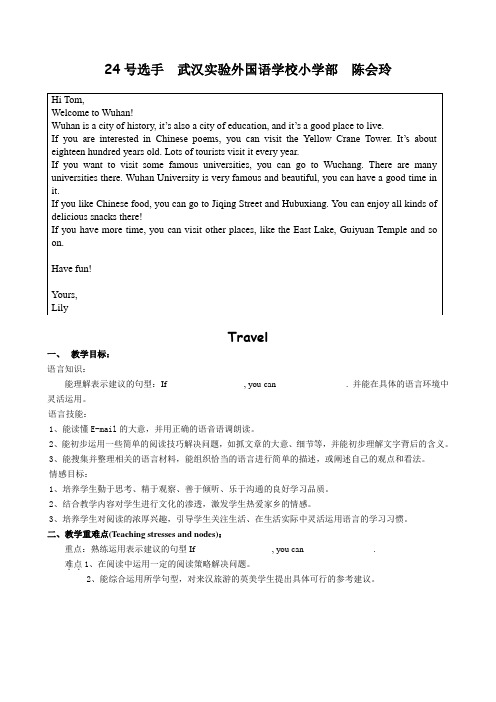
24号选手 武汉实验外国语学校小学部 陈会玲Travel一、 教学目标:语言知识:能理解表示建议的句型:If _________________, you can________________. 并能在具体的语言环境中灵活运用。
语言技能:1、能读懂E-mail 的大意,并用正确的语音语调朗读。
2、能初步运用一些简单的阅读技巧解决问题,如抓文章的大意、细节等,并能初步理解文字背后的含义。
3、能搜集并整理相关的语言材料,能组织恰当的语言进行简单的描述,或阐述自己的观点和看法。
情感目标:1、培养学生勤于思考、精于观察、善于倾听、乐于沟通的良好学习品质。
2、结合教学内容对学生进行文化的渗透,激发学生热爱家乡的情感。
3、培养学生对阅读的浓厚兴趣,引导学生关注生活、在生活实际中灵活运用语言的学习习惯。
二、教学重难点(Teaching stresses and nodes):重点:熟练运用表示建议的句型If _________________, you can________________.难点..1、在阅读中运用一定的阅读策略解决问题。
2、能综合运用所学句型,对来汉旅游的英美学生提出具体可行的参考建议。
Hi Tom, Welcome to Wuhan! Wuhan is a city of history, it ’s also a city of education, and it ’s a good place to live. If you are interested in Chinese poems, you can visit the Yellow Crane Tower. It’s about eighteen hundred years old. Lots of tourists visit it every year. If you want to visit some famous universities, you can go to Wuchang. There are many universities there. Wuhan University is very famous and beautiful, you can have a good time in it. If you like Chinese food, you can go to Jiqing Street and Hubuxiang. You can enjoy all kinds of delicious snacks there! If you have more time, you can visit other places, like the East Lake, Guiyuan Temple and so on. Have fun! Yours, Lily三、师生互动过程(Processes of teaching )主要步骤师生活动谈话引入营造氛围1) Say hello to Ss, sing a song If you are happy.2) Introduce Tom to Ss. I have a new friend, his name is Tom.He likes to travel. Do you like to travel? We often write e-mails to each other. Look, this is his e-mail.3) Ask Ss to read Tom’s e-mail, then answer the teacher’s question.T: What is Tom going to do ?Ss:He is going to visit Wuhan.T:Look !This is Wuhan,let's watch the video.巧设情境自然导入1). Have Ss watch the video and ask them some questions.How many towns are therein Wuhan? What are they?2). Play a game. What can you see?3). Ask Ss to name other famous places in Wuhan.T: There are so many wonderful places in Wuhan, which places will Lily introduce to Tom? Can you guess?渗透方法有效阅读1) Let Ss listen to the e-mail, circle the places they hear. Check the answers.2)T: You can find out more information in the e-mail.Look! This is Lily's e-amil!An e-mail is differrent from a letter,it is not very formal.让学生上来摆一摆e-mail的开头和结尾,简单讲解e-mail的格式。
英语教案Travel
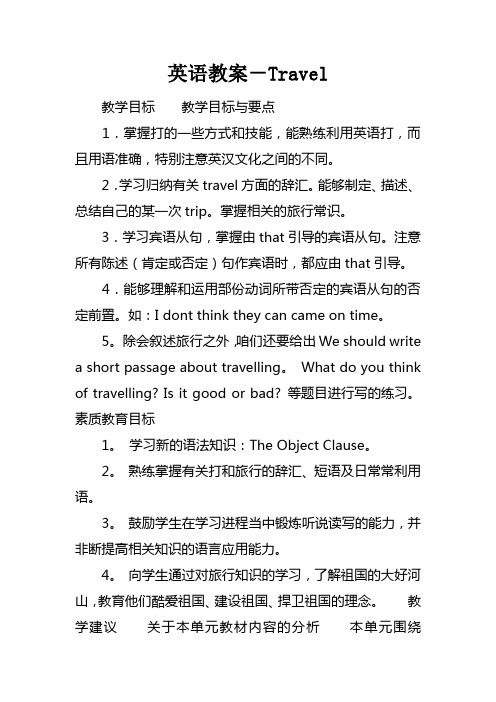
英语教案-Travel教学目标教学目标与要点1.掌握打的一些方式和技能,能熟练利用英语打,而且用语准确,特别注意英汉文化之间的不同。
2.学习归纳有关travel方面的辞汇。
能够制定、描述、总结自己的某一次trip。
掌握相关的旅行常识。
3.学习宾语从句,掌握由that引导的宾语从句。
注意所有陈述(肯定或否定)句作宾语时,都应由that引导。
4.能够理解和运用部份动词所带否定的宾语从句的否定前置。
如:I dont think they can came on time。
5。
除会叙述旅行之外,咱们还要给出We should write a short passage about travelling。
What do you think of travelling? Is it good or bad? 等题目进行写的练习。
素质教育目标1。
学习新的语法知识:The Object Clause。
2。
熟练掌握有关打和旅行的辞汇、短语及日常常利用语。
3。
鼓励学生在学习进程当中锻炼听说读写的能力,并非断提高相关知识的语言应用能力。
4。
向学生通过对旅行知识的学习,了解祖国的大好河山,教育他们酷爱祖国、建设祖国、捍卫祖国的理念。
教学建议关于本单元教材内容的分析本单元围绕“Travel”这一中心话题,结合Lesson 14“Jim’s train ride”和与travel相关的对话Lesson 15开展教学活动。
Lesson 13是由格林先生打给校长引出了本单元的语法功能项目——宾语从句。
由that引导的宾语从句是本单元教学的重点知识之一。
本单元学习了用英语写留言(telephone message),重现和新学了一些打的专用术语。
本单元所论述的有关travel的内容,和咱们生活密切相关,如Lesson16,应灵活掌握,就其中的某些问题能有自己的独特观点。
对于有关travel的交际用语,学生应学会熟练地利用。
本单元句型及日常交际用语1。
- 1、下载文档前请自行甄别文档内容的完整性,平台不提供额外的编辑、内容补充、找答案等附加服务。
- 2、"仅部分预览"的文档,不可在线预览部分如存在完整性等问题,可反馈申请退款(可完整预览的文档不适用该条件!)。
- 3、如文档侵犯您的权益,请联系客服反馈,我们会尽快为您处理(人工客服工作时间:9:00-18:30)。
高一英语第四单元Travel (旅行) 科目英语年级高一文件high1unit4.4.doc 标题Travel(旅行) 章节第四单元关键词内容一、教法建议【抛砖引玉】同学们,你喜欢旅行吗?从祖国冰天雪地的北疆到风光旖旎的南国,从天山之麓到东海之滨,祖国的名山大川美不胜收。
万里长城是中华民族魂的象征,多少游人足蹬长城激昂慷慨。
冰天雪地的青藏高原,耸立着神圣的珠穆琅玛,有谁不慨叹它的巍峨与高大?波涛涌动的东海之滨,帆影点点,无数志士伟人赞叹它的雄奇与宽阔的胸怀,乘风破浪,直挂云凡济苍海。
登山则情满于山,观海则意溢于海。
看着那鲜花、碧草与冰雪为邻的别样景致,欣赏着白云从身旁飘过,羡慕着雄鹰在天空翱翔,真让人沉浸在美好的遐想中。
如果你到了海边,你一定会感到海在笑,粼粼地笑,一片青苍辽阔的碧水,染透了深邃无边的翠色。
在波涛上轻浮着的渔船,像是摇荡在波澜不惊的油画里。
从乌拉尔山顶的皑皑白雪到白令海峡的滔天海潮,从椰林飘香的印度支那半岛到冰天雪地的西伯利亚荒原,你想领略这一切吗?领略克里姆林宫的威严、感受日内瓦的温柔、欣赏波罗的海的惊涛骇浪、评鉴自由女神像的潇洒。
无论是熙暖韵致的春,浓绿热忱的夏,冷清浪漫的秋,幽静洁白的冬,……每一片土地,每一处古迹都会给你一种无可名状的激情,一种源远流长的文明气息将充溢你的全身,渗入你的每一个细胞。
从本单元的课文中,我们了解到的是在不断的技术创新的动力支撑下,人类征服和超越自然环境、扩大和拓展人工自然的文明进程可谓是风帆高扬、凯歌行进;在当代大多数人的生存环境中,各种建筑物和街道所组成的人工建造的物质环境逐渐取代了由森林、河流、山川和平原所组成的自然环境,充满“田园牧歌”意味的自然环境正逐渐隐去,并退缩到人类意识的一个被遗忘的角落之中。
然而就在社会生产力得到成百倍增加,社会生产方式发生巨大变迁,人口激增,工业化和城市化过程迅猛推进的同时,环境污染作为一种巨大的危机也开始第一次降临到人类的头上:到处是林立的烟囱和浓密的黑烟,浑浊的河流,遍地的工业废物,失去生机的大地和森林。
农业时代的那种“落霞与孤骛齐飞,秋水共长天一色”的“田园牧歌”景色已不再有,人与环境和谐相处的那种“采菊东篱下,悠悠见南山”的自然审美情趣也逐渐远去,人类从此仿佛是踏上了一条远离养育自己的大地自然母亲的不归路。
这一切难道不令人深思吗?【指点迷津】A.单元重点新词读音归类1.[]taxibankparrot2.[]airportreporter3.[a:]guitarsharpKlarke4.[]hotelbone5.[ai]guidewildsightmileprice6.[]soildestroy7.[]bank8.[z]phrase9.[ju:]future10.[i:]centimetreweekend11.[i]separate( B.单元重点新词透视 1.separate 作形容是“单独的,各自的”,作动词是“分开,分离”。
如:Bobwillseparatethebadapplesfromthegoodones.鲍勃要把坏苹果与好苹果分开来。
HeseparatedtheboysfromthegiPleasecutitintothreeseparateparts.请把它分成3份。
Keeptheonionsseparatefromthebreadorthey\'llmakeit smell.把洋葱和面包分开放,否则面包会有味儿。
liveseparate分居。
Thechildrensleepinseparatebeds.孩子们分床睡的。
测试要点: (1)搭配:separate…from…把……与……分开 (2)辨析:separate…from…与divide…into…separate含把原来结合在一起的、混合在一起的分开或者隔离。
divide含把整体分成若干部分。
如:Separateyourthingsfrommine./Hedividedtheappleinto halves./Thehouseisdividedintofourparts.这座房子被分作了四部分。
(3)taxi作名词是“出租车”,相当于taxicab,cab,作动词是“坐出租车,用出租车送”。
如:Wetaxiedtothetheatre.我们坐出租车去戏院。
Thevisitorshavebeensafelytaxiedtothehotel.客人们已被出租车安全送到旅馆。
测试要点: (1)在一般现在时中,用在第三人称主语后或者作名词的复数:taxis=taxies (2)搭配:takeataxito+地点,bytaxi乘出租车,gobytaxi=goinataxi乘记程车去,打的去,getin/intoataxi上出租车(注意不是geton),getoutofataxi下出租子(注意不是getoff)。
(3)该词的现在分词是:taxiing=taxying。
出租汽车驾驶员是:taximan。
3.weekend周末(星期六和星期日)。
作动词是“度周末”。
如:Idon\'tworkatweekends.(美语中用:onweekends)WearegoingforalongweekendtoParis.我们要去巴黎度一个长周末。
(即从星期五至星期天或星期一)Heweekendedawayfromhomelasttime.上次他离开家度周末了。
测试要点:区别:weekend与weekday weekday周日(指除星期日以外或除星期日和星期六以外的日子),在周日。
如:Sheworks(on)weekdays.她平时天天上班。
4.guide作名词是“向导,导游者,领路人,指导者,指南,入门”,作动词是“为……领路,带领,引导,指导”。
如:Experienceisagoodguide.经验就是很好的导师。
atraveller\'sguide旅客指南,guidetheboysintheirstudies指导孩子们学习。
Iknowtheplacewell,soletmebeyourgu测试要点:(1)“对……的指导”的介词在测试中用to。
如:aguidetoEnglishgrammar英语语法向导,Hisbook,AGuiddetoPoultryKeeping,istobepublishedne xtmonth.他的《家禽饲养手册》下月就要出版了。
(2)不用“guidesbtodo”应用“guidesb+in(into,through,towards…”。
如:Ourpartyleadsusinbuildingsocialism./Iguidedthebli ndmantohiss5.sight作名词是“情景;风景;目光;视力;看到;视野”。
作动词是“见到”。
如:Shelosthersightinanaccident.她在一次事故中失明了。
Keepoutofmysight!别让我再看见你!测试要点:(1)搭配:havelong/farsight远视。
haveshort/nearsight近视。
havegood/poorsight视力好/差。
haveone\'ssighttested视力检查。
insight可看得见的,在视线内。
outofsight看不见的,在视程之外。
catch/have/getsightof突然瞥见。
atthesightof一看见……就。
atfirstsight乍一看,第一眼。
如:Theyranawayatthesightofthepolice.他们一看见警察就逃之夭夭了。
Icaughtsightofherhurryingaway.我瞥见她匆匆走了。
(2)作“风景”讲常用复数。
如:Thesunsetwasabeautifulsight.日落是很美丽的景象。
JohnenjoyedseeingthesightsoftheWestLake.约翰很喜欢观赏西湖风景。
(3)辨析:sight,scenery,view,scene sight指“景色”是可数名词时,往往指眼见的景色,如供人游览的“景”和“名胜”,但尤指人工制成的景。
Oneofthebeautifulsightsisthecastle.那城堡是美景中的一个。
scenery是个不可数名词,含不管是否映入眼帘的风景。
Theroadpassesthroughthemostcharmingscenery.这条大路穿过极为迷人的风景区。
view和scene所表达的景色都是scenery中的一部分,往往指自然景色。
如:DoyouenjoythetenfamousviewsoftheWestLake?你喜欢西湖十景吗?Thereisalovelyviewfromthiswindow.从这个窗子可以看到一片秀丽的景色。
Thereisahappysceneofchildrenplayinginthegarden.孩子们在花园里玩耍,好一派欢乐的景象。
另外,scene 还可指舞台的场景。
[1][2][3][4][5][6]下一页6.price是可数名词“价格,价钱”“代价”。
当不表示物品的具体价格,而只表示“价格”的概念时是不可数名词。
如:What\'sthepriceofthiscoat?这件衣服多少钱?Housepricesaregettinghigher.房价在上涨。
注意该词名词复数的发音为[praisiz] 测试要点: (1)价格分“高底”,物品分“贵贱”。
如:(错)Thepriceisexpensive/ch(对)Thebookisexpensive/ch (2)价格作主语时,疑问句不能用howmuch提问,应用What。
如:Whatisthepriceofcabbagestoday?=Whatpriceofcabbage stoday?今天洋白菜啥价? (3)搭配:sellsthatahigh/lowprice以高价或低价出售。
atanyprice=atallcosts不惜任何代价。
payahighpricefor为……付出很高的代价。
above/beyond/withoutprice无价之宝。
(4)区别:price,cost,value,worth,charge,expense price定价(指卖方对物品所要求的价格,高于cost) cost价值,成本(指对货物所付的一切代价,如制作、包装、运输等)value价值(按人的主观判断对物品本身内在的有用评价)。
如:Ipaidhim$500forthepainting,butitsrealvaluemustbea bout$50,000. worth价值(指物体本身永远不变的价值,含着一定金额的数量,用法比较特殊)。
